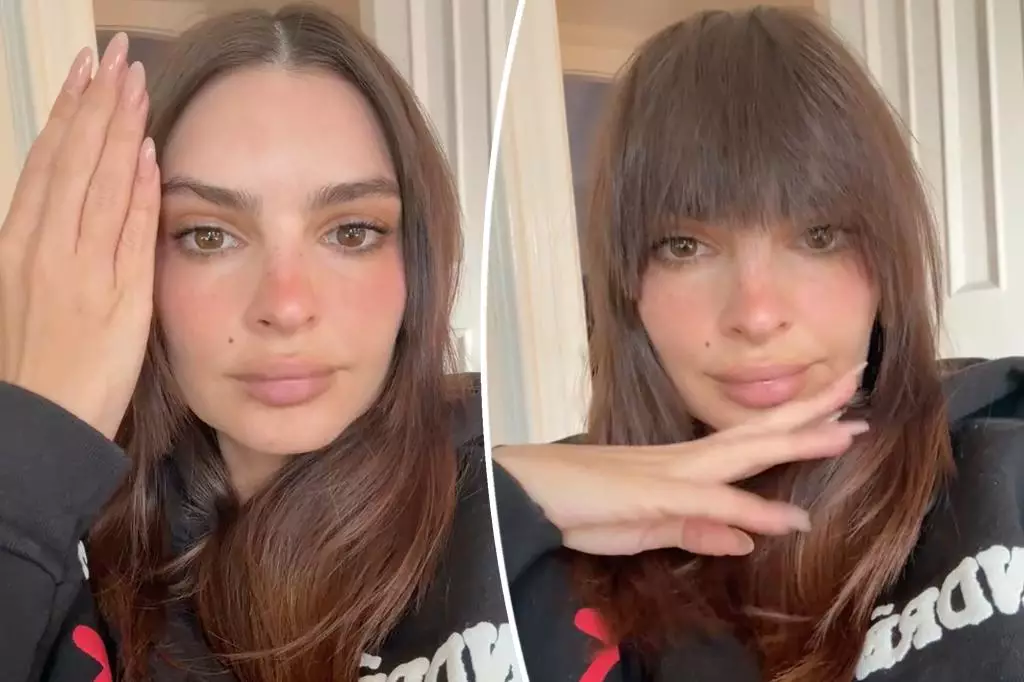In a world dominated by perfectly curated social media feeds, Emily Ratajkowski’s revelation of her unfortunate haircut is a stunning reminder of reality behind the glam. This incident brings to light that even celebrities, who often seem untouchable in their allure, can fall victim to the pitfalls of hairdressing misadventures. Just last week, Ratajkowski took to TikTok, showcasing a haircut that she candidly called “the worst of my life.” This honest admission not only exposed her vulnerability but also struck a chord with countless followers who empathized and found humor in her predicament.
Finding Humor in the Awkward
In her TikTok video, Ratajkowski’s self-deprecating humor shines through as she shields part of her hair, joking about the necessity of a filter to boost her confidence. Her candidness is refreshing; it highlights how humor can offer solace when faced with social expectations. Rather than concealing her mishap, she invites her audience to share in the experience, creating a relatable moment that resonates well beyond the world of high fashion. Observing her playful self-reflection, one cannot help but think about the myriad of times we’ve personally endured similar beautifying blunders, emerging with uneven bangs or lopsided layers.
A Lesson in Community and Support
The reaction within the comment section reflects a robust community support system that exists online. Followers quickly rallied to champion Ratajkowski, showing a united front against the judgment often experienced in the face of beauty disasters. Comments ranged from sympathizing with her plight to humorously likening her style to iconic or cringe-worthy looks. This mix of support and jest creates a safe space where others can also share their own hair horror stories, reinforcing the idea that a bad haircut is merely a moment in time, not a defining characteristic. Celebrities leveraging their platforms to instigate real conversations about imperfections fosters a sense of connectedness—reminding us that everyone has battled a fashion faux pas.
From Frustration to Empowerment
As Ratajkowski expressed her perspective on the haircut—“Is it giving like member of the Dare, or is it giving Karen O”—she masterfully transformed her frustration into a form of creative expression. It prompts us to question how experiences that seem overwhelmingly negative can instead carve pathways to empowerment and self-discovery. By showcasing the aftermath of her mishap, she highlights an aspect of personal style that transcends conventional definitions of beauty. What Ratajkowski inadvertently illustrates here is pivotal: embracing our flaws can sometimes lead to profound moments of personal growth and creativity.
The Reality of Hair and Identity
Ratajkowski’s hair journey offers insight into the complex relationship between hair and identity. Hair has long been a crucial aspect of self-expression, and a “bad” haircut can feel deeply impacting. Yet, Ratajkowski’s ability to navigate this experience promotes a vital take-home message: hair does not define the entirety of a person. Instead, it acts as one of many canvases through which we express our individuality. Just as she humorously recognized the reality of her situation in a follow-up video, where she channels a character from “Fleabag,” this narrative serves as a touchstone for many who similarly grapple with their own hair identity.
In celebrating this blend of vulnerability and empowerment, it’s evident that with a bit of humor—and a community to uplift us—no bad haircut can stand in the way of authenticity.

